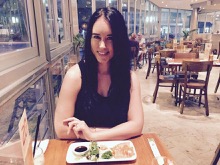Rebekka Frazer is the lovely dietitian at Northside Allied Health; she is also a diagnosed Coeliac, so the perfect candidate to talk about all things gluten, during Coeliac Awareness Week 13-20th March.
Q1: Being a coealiac yourself, Rebekka, you must feel like you have a real inside knowledge into the disease. Can you briefly share your story of how you were first diagnosed and the difference a gluten free diet has made to your life?
A. I was diagnosed several years ago now, whilst studying my first degree at uni. Everyone will experience different symptoms, but for me guess I didn’t realised how bad I was actually feeling until gluten was out of my diet. I can now enjoy yoghurt without cramping as my gut lining has repaired itself enough to start making lactase again (the enzyme required to break down lactose, the sugar naturally present in most dairy products).
Q2: Undiagnosed coeliac disease is associated with an increased risk of other serious conditions – infertility, osteoporosis, lymphoma, higher risk of other autoimmune conditions. What sort of symptoms should people watch out for and how do you separate these symptoms from other similar conditions, like wheat allergies?
A. Everyone’s experience with coeliac disease will be different but some of the common symptoms you should be looking out for include:
- Abdominal pain/cramping
- Diarrhoea or constipation
- Nausea, vomiting
- Bloating
- Fatigue
Many sufferers will also experience certain vitamin and mineral deficiencies (e.g. iron deficiency) as a healthy gut lining plays a key role in nutrient absorption within the body. Some sufferers will also experience lactose intolerance as the enzyme required to digest lactose in also produced at the gut lining.
Wheat allergies involve the immune system and often require a skin prick test (through a qualified allergist) to confirm diagnosis. Symptoms can range from an itchy throat or rash on the skin, headaches, cramping and diarrhoea, right through to an anaphylactic reaction in the most extreme cases.
Q3. Once diagnosed, many people take a while to come to terms with the new way of life and they mourn the foods they can no longer eat. What is your advice to these people both professionally and personally as a coeliac.
A. Being diagnosed with coeliac disease is definitely easier these days compared with 20 years ago. There are so many products on the market suitable for those requiring a strict gluten free diet and most restaurants have even more gluten free options on the menu than they do vegetarian options. There is certainly more awareness around coeliac disease these days with more and more people being diagnosed (often after many years of feeling unwell).
One of the best things about being diagnosed with coealic disease is that it forces you to be more creative with your meals. Focus on what you can enjoy rather than the foods you can no longer eat.
For more information on Rebekka and the dietetics service offered at Northside Allied Health, visit this page.

